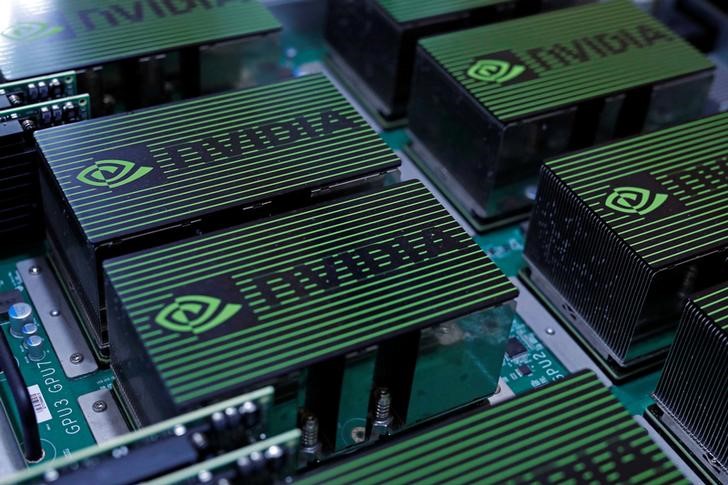Envirotech Vehicles appoints Jason Maddox to board of directors
HAMBURG, Germany - NVIDIA (NASDAQ: NVDA), a dominant force in the semiconductor industry with remarkable revenue growth of 86% in the last twelve months, announced today that its JUPITER supercomputer, based on the NVIDIA Grace Hopper™ platform, has become the fastest in Europe, offering double the speed of the continent’s next-fastest system for high-performance computing (HPC) and AI workloads. According to InvestingPro data, NVIDIA maintains an impressive 70% gross profit margin, demonstrating its technological leadership and pricing power in the AI computing space. JUPITER is projected to achieve exascale computing, performing 1 quintillion FP64 operations per second, marking a significant milestone for European computational capabilities.
The supercomputer is housed at the Jülich Supercomputing Centre in Germany and is part of the EuroHPC Joint Undertaking, reflecting a collaborative effort to bolster scientific research and innovation across Europe. NVIDIA’s strong market position is reflected in its financial health, with InvestingPro analysis showing excellent overall financial health scores and robust cash flows that easily cover its obligations. With its advanced computing power, JUPITER is poised to accelerate a wide range of applications, from climate modeling and quantum research to structural biology and astrophysics.
JUPITER distinguishes itself not only in speed but also in energy efficiency, leading the TOP500 list of the world’s fastest supercomputers with 60 gigaflops per watt. The system integrates nearly 24,000 NVIDIA GH200 Grace Hopper Superchips and uses the NVIDIA Quantum-2 InfiniBand networking platform. It is also based on the BullSequana XH3000 liquid-cooled architecture from Eviden™ and leverages NVIDIA’s comprehensive software stack for optimized performance.
The supercomputer’s capabilities are expected to extend to over 90 exaflops of AI performance. Jensen Huang, NVIDIA’s founder and CEO, emphasized the transformative potential of AI in scientific discovery and industrial innovation, stating that JUPITER will empower leading researchers, industries, and institutions in Europe.
The EuroHPC Joint Undertaking’s executive director, Anders Jensen, highlighted JUPITER’s role as a catalyst for foundational research, while Thomas Lippert and Kristel Michielsen of the Jülich Supercomputing Centre elaborated on the system’s impact on foundation model training, high-performance simulation, and quantum algorithm development.
Emmanuel Le Roux, senior vice president and global head of advanced computing at Eviden, Atos Group, praised the technical success and rapid delivery of the exascale machine, underscoring its significance for European high-performance computing.
Early tests using the Linpack benchmark have confirmed JUPITER’s performance, which will support diverse research initiatives, including NVIDIA’s Earth-2 platform for environmental simulations and the Earth Virtualization Engines project aimed at creating a digital twin of Earth for climate change analysis.
Researchers from Germany and other European nations can apply for access to JUPITER, which stands as a testament to NVIDIA’s (NASDAQ: NVDA) leadership in accelerated computing. The company’s stock has shown strong momentum, delivering a 17% return over the past year. The information about JUPITER’s capabilities and its role in advancing European science and technology is based on a press release statement from NVIDIA. For comprehensive analysis of NVIDIA’s financial metrics, valuation, and growth prospects, investors can access detailed Pro Research Reports available on InvestingPro, which covers over 1,400 top US stocks with expert insights and actionable intelligence.
In other recent news, Nvidia’s latest chip advancements have demonstrated significant progress in training large AI systems, as reported by MLCommons. The data indicates a substantial reduction in the number of chips required for training extensive language models, with Nvidia’s new Blackwell chips performing over twice as fast as the previous generation. Meanwhile, Nvidia’s recent earnings report highlighted a 64% growth in its networking segment, reaching $5 billion, driven by both scale-up and scale-out products. This growth was supported by NVLink solutions and the Spectrum-X Ethernet portfolio, which gained traction with new customers.
Furthermore, UBS analysts have maintained a Buy rating on Nvidia, citing the company’s potential in the data center sector and its visibility into significant AI infrastructure projects. They estimate a revenue opportunity of at least $1 trillion from these projects. Similarly, Citi analysts reiterated their Buy rating, emphasizing Nvidia’s strategic focus on AI networking and the optimization of compute and storage with its Dynamo operating system. BofA Securities also reiterated a Buy rating for Nvidia, noting strong demand for its cloud and enterprise offerings and highlighting the company’s advantageous position in the AI sector.
Additionally, the UK’s Financial Conduct Authority has partnered with Nvidia to offer advanced computing power and AI software in a new regulatory sandbox. This initiative aims to support financial firms in the early stages of exploring AI by providing access to technical expertise and regulatory support. The collaboration is part of a broader strategy to promote innovation and economic growth in the financial sector.
This article was generated with the support of AI and reviewed by an editor. For more information see our T&C.
